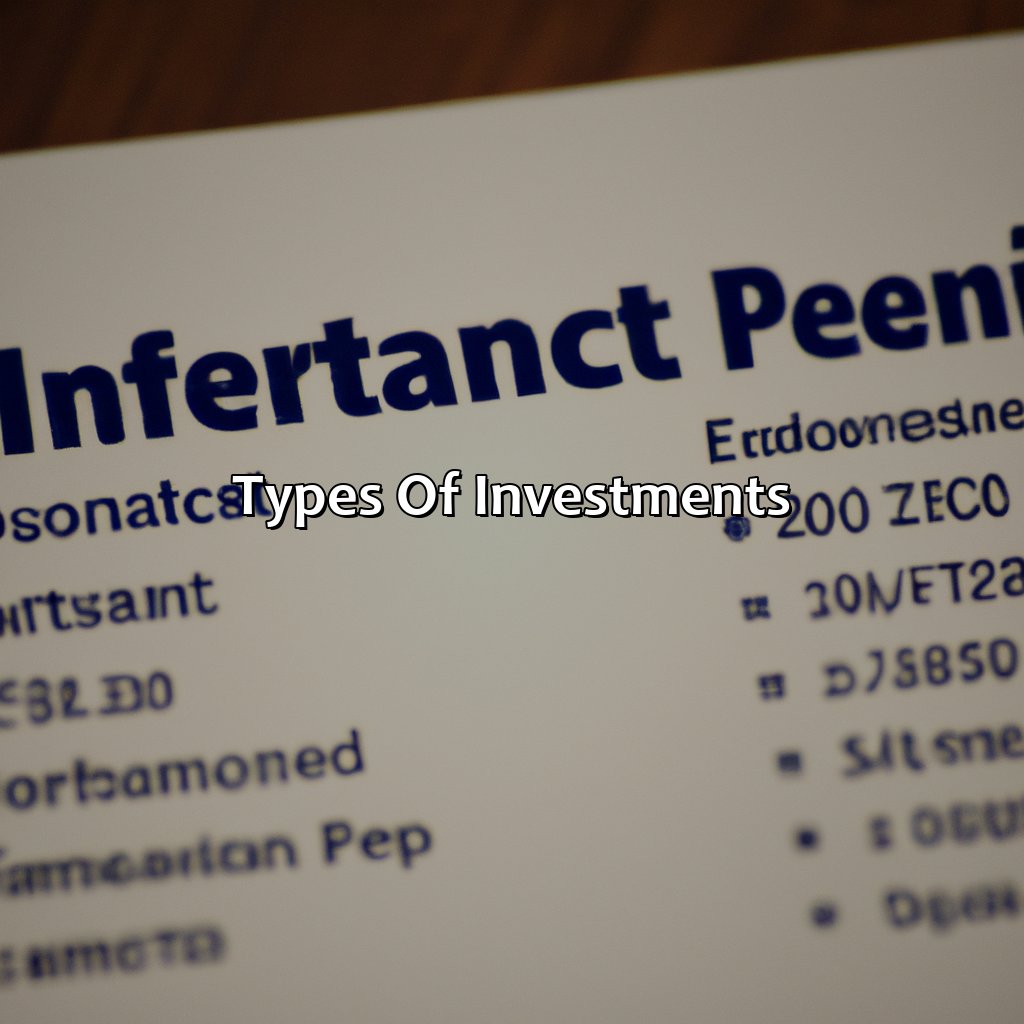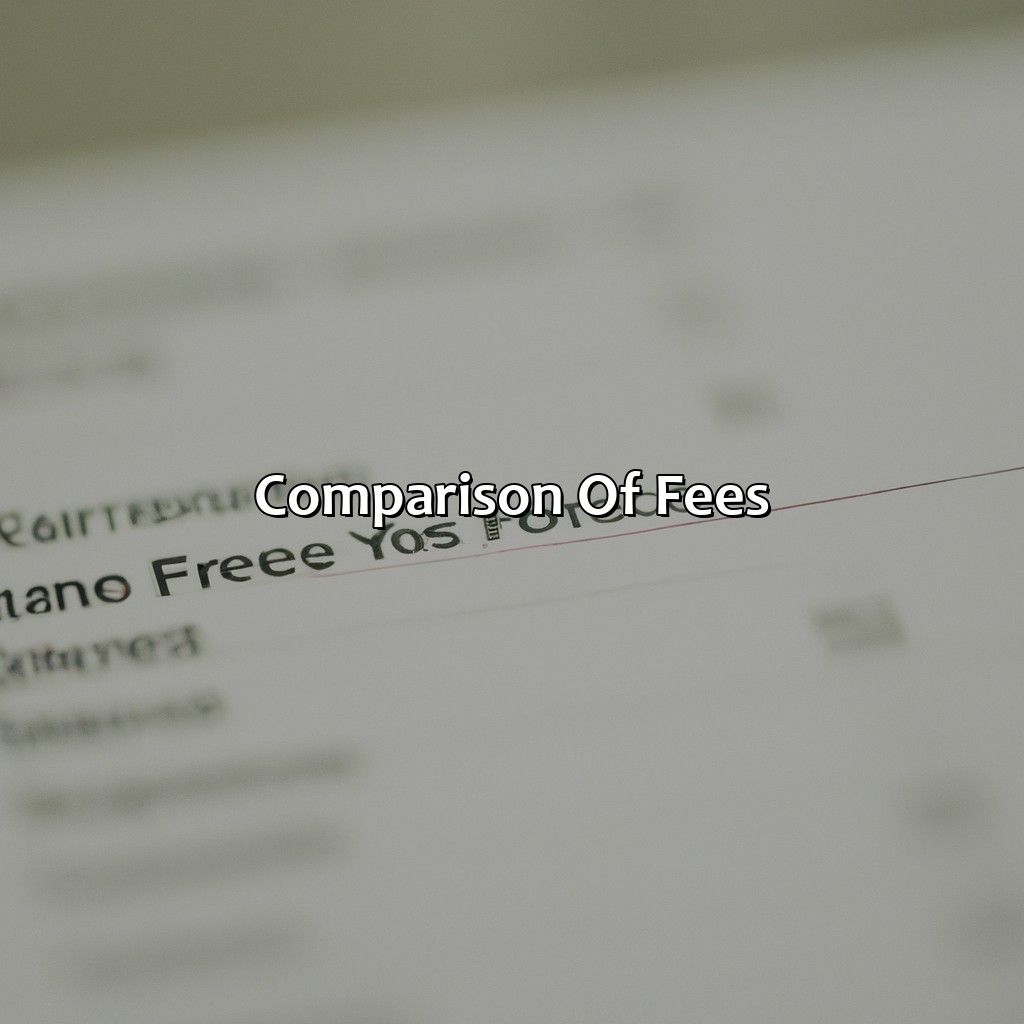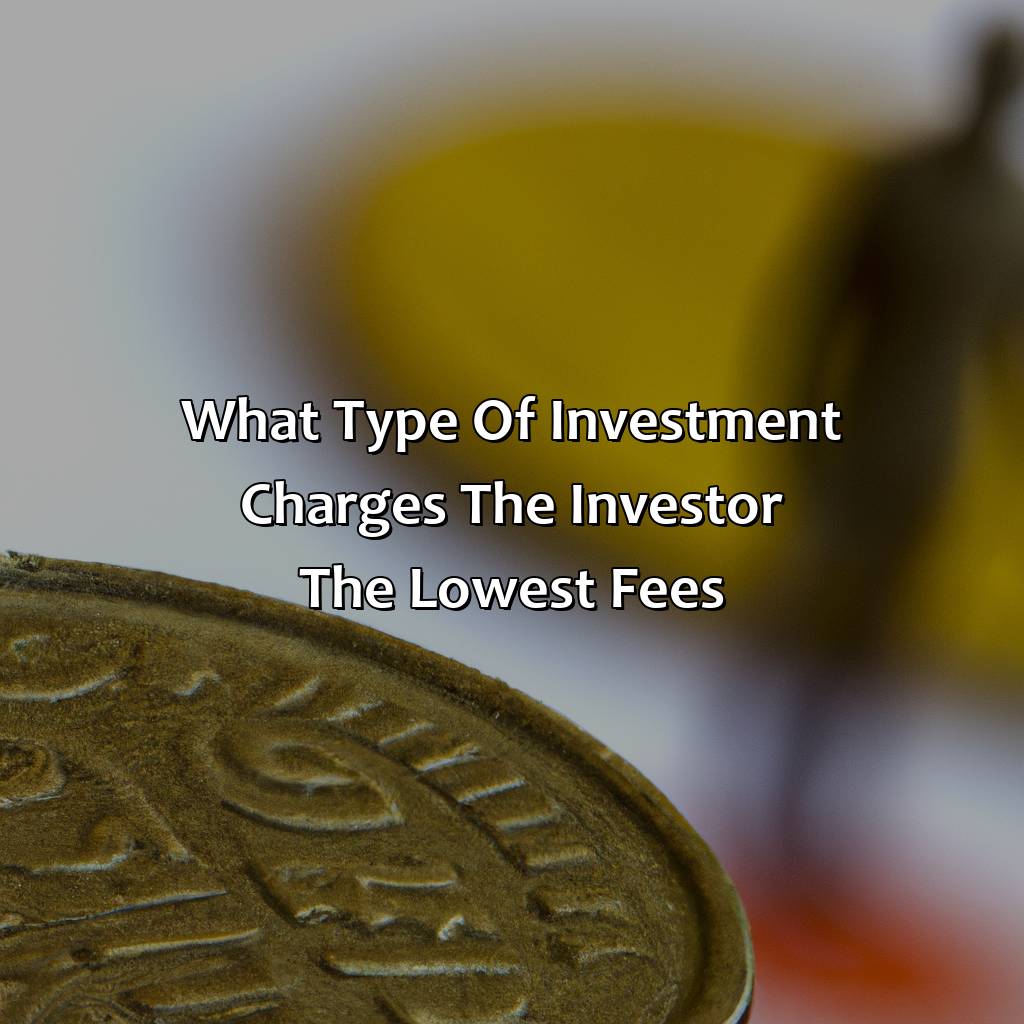What Type Of Investment Charges The Investor The Lowest Fees?
Key Takeaway:
- Index funds charge the lowest fees: Index funds are designed to track a specific market index, such as the S&P 500. They are passively managed, meaning they require less human intervention and are less expensive to operate. This results in lower fees for investors compared to actively managed mutual funds or ETFs.
- Expense ratios are the most important fee to compare: The expense ratio is the annual fee that funds charge their investors for managing their money. It is important to compare the expense ratios of different investment options to ensure that you are getting the best deal. A lower expense ratio means that more of your money is working for you.
- Brokerage fees and transaction fees can significantly impact overall costs: In addition to expense ratios, investors should also be aware of other fees, such as brokerage fees and transaction fees. These fees can add up over time and significantly impact overall investment costs. It is important to consider all fees when comparing investment options.
Are you struggling to choose from a range of investments? Don’t pay too much – explore the various fees and charges to identify the best option for you. Discover which investment charges the lowest fees and offers the greatest returns.
Types of investments
Want to find the investment with the lowest fees? Check out “Types of Investments”. Look at “Mutual Funds”, “Exchange-Traded Funds (ETFs)” and “Index Funds”. Each of these has potential for low-fee investing. Maybe one of them is right for you and your investment goals.

Image credits: retiregenz.com by James Arnold
Mutual funds
Investing in a portfolio of professionally managed securities, commonly referred to as ‘Cooperative Investments’ or more commonly ‘Mutual Funds‘, has become remarkably popular among retail and institutional investors. Utilizing economies of scale not available to individual investors, mainstream mutual funds provide diversification benefits by pooling multiple individual investments into one fund.
These investment vehicles offer benefits for investors who wish to achieve a diversified portfolio without the time or expertise required to research individual investments. They can be offered in various forms including Equity, Index funds, Fixed Income and other portfolios meeting various investment objectives.
Investors in mutual funds should note that they are charged fees which vary by fund type, investment vehicle, and risk level. The fees can include but aren’t limited to: sales commissions, expense ratios, exchange fees, management & trading fees that are applied irrespective of performance results. Moreover, the least expensive Mutual Funds also have an expense ratio associated with them.
Recently developed Exchange Traded Funds (ETFs) offer a cheaper alternative where the difference between expenses is shown in the Expense Ratio figures available from online providers such as Morningstar or Yahoo Finance.
In summary, Investment Managers aim towards creating Mutual Funds which demonstrate low fees relative to their respective benchmarks. As an investor interested in following this trend should take advantage of ETF options and keep track of related expense ratios proactively rather than allocating capital solely on cost factors alone.
ETFs: because sometimes it’s good to have commitment issues in your investment portfolio.
Exchange-traded funds (ETFs)
One type of investment that charges low fees for investors is a group of securities called exchange-traded products (ETPs). ETPs are similar to mutual funds, but they trade like stocks on an exchange.
ETPs can be categorized into three main types: exchange-traded funds (ETFs), exchange-traded notes (ETNs), and exchange-traded commodities (ETCs). Among these, ETFs tend to have the lowest fees. This is because they usually passively track stock market indexes insteads of hiring fund managers to actively trade.
In addition to lower fees, ETFs also provide diversification by holding many different stocks or bonds within one investment. This reduces risk compared to buying individual securities. Furthermore, there are many different types of ETFs available, so investors can choose from a variety based on their personal preferences and risk tolerance.
For investors looking for low fee investments with diversification benefits, we suggest researching and purchasing ETFs. It’s important to consider factors such as the underlying index/tracking strategy, expense ratio, trading volume, and liquidity before investing in any particular ETFs.
Index funds: the marriage of low fees and passive aggression towards actively managed funds.
Index funds
Investments that track a particular market index are known to charge the investor relatively low fees. These funds, commonly referred to as passive funds or market-tracking funds, invest in the same stocks and bonds that make up the relevant index. By mimicking the market, these investments provide long-term returns at a lower cost than actively managed investments. This makes them an attractive option for those who prefer low-cost investments with a proven track record.
It’s important to note that while index funds offer lower fees, they may not provide returns as high as some actively managed investments. However, their reliable performance over time can make them a smart choice for investors seeking steady returns without excessive fees.
Pro Tip: When selecting an index fund, it’s crucial to compare fees across different investment options and ensure that you understand any associated risks before investing. Just like in a relationship, comparing fees is crucial in finding the right investment match for your wallet.
Comparison of fees
Uncover the secrets of investing with the lowest fees! Delve into the Comparison of Fees part. It examines Expense Ratios, Brokerage fees and Transaction fees. See the advantages that each sub-section can bring to your investments.

Image credits: retiregenz.com by Joel Washington
Expense ratios
Investment Expenses- The Costs Associated with Investing
Investment expenses are commonly known as expense ratios. It is the percentage of an investment’s assets that are used to cover the costs of running and managing it. This includes management fees, administrative fees, trading costs and other operating expenses. Expense ratios are essential as they show how much investors pay to invest in a fund annually.
Expense ratios vary between different types of investments, for example, index funds generally have lower expense ratios than actively managed mutual funds. Exchange-traded funds (ETFs) also tend to have lower expense ratios than mutual funds due to their unique structure.
It is crucial for investors to choose investments with low expense ratios since high expense ratios can significantly erode returns over time. In summary, low investment-related fees may lead to significant cost savings for an investor.
According to Morningstar’s research on investment fund costs in 2020, passive index funds showed an average annual fee of 0.15%, while active mutual funds recorded an average fee of 0.70%.
Who needs a broker when you can just donate your money to them directly through their exorbitant fees?
Brokerage fees
Brokerage charges can significantly impact investment returns, therefore discovering the most cost-effective type of investment is fundamental. Here are some insights into “Costs Associated with Investment Plans”:
- One-Time Fee: They comprise transaction fees for executing trades, purchase or sale of stocks, or brokerage charges associated with a trade settlement.
- Commission Fee: It represents a percentage charge on a deal’s financial value that the brokerage service earns each time it performs an operation.
- Operating Expenses: Consist of management fees incurred by mutual or exchange-traded funds and other expenses to maintain accounts.
- Front-end Load Vs. Back-end Load: A fee levied either at the initial investment level is called “front-end load”, whereas a fee imposed after exiting the investment plan is known as “back-end load”.
- Annual Account Maintenance Fees – Brokerage services may levy such expenses as account maintenance fees for providing regular statements and maintaining online accounts.
A highly significant factor attributed to minimal investments occurs when investors opt for Self-Directed Investing through discount brokers instead of traditional brokerage firms.
The Financial Conduct Authority (FCA) found that approximately 45% of retail investors utilizing self-invested personal pension (SIPP) often overpay gateway pension providers in cash due to unclear compensation structures they follow.
“Transaction fees are like the Grim Reaper, slowly but surely collecting a piece of your investment with each trade.”
Transaction fees
Investment Transaction Costs: These fees encompass all costs incurred during the buying or selling of an investment. They are mostly charged when an investor makes a trade of any kind, and they vary depending on the type of transaction. For example, some brokers charge flat rates while others charge percentages based on the value of assets traded. Most transaction costs include brokerage fees, commissions, clearing fees and exchange fees.
The brokerage fee is the primary component in transaction costs since brokers receive compensation for connecting buyers and sellers or making investments on behalf of clients. Higher prices may be charged by brokers with greater experience in the field.
Pro Tip: As a point of focus, investors should compare brokerage fees across different firms as it can make a significant impact on overall returns over time.
Five Facts About Investments with Low Fees:
- ✅ Index funds generally have the lowest fees of all investment options. (Source: Investopedia)
- ✅ Low-cost exchange-traded funds (ETFs) are also an inexpensive investment option. (Source: Forbes)
- ✅ Online platforms like Robinhood and Betterment allow for low-fee investing with no account minimums. (Source: NerdWallet)
- ✅ Actively managed mutual funds tend to have higher fees than passive options like index funds and ETFs. (Source: The Balance)
- ✅ Choosing a high-quality discount broker can also lower fees for stock and bond investing. (Source: The Motley Fool)
FAQs about What Type Of Investment Charges The Investor The Lowest Fees?
What type of investment charges the investor the lowest fees?
Index funds often charge the investor the lowest fees as they simply track a market index, rather than requiring active management.
Are there any other low-fee investment options besides index funds?
Exchange-Traded Funds (ETFs) are also a popular low-fee investment option. Similar to index funds, they aim to track a specific market or sector.
How do the fees of mutual funds compare to index funds and ETFs?
Mutual funds often charge higher fees due to their active management approach. They rely on fund managers to make investment decisions which can lead to higher costs, which are passed on to the investor.
What other factors should I consider when choosing a low-fee investment option?
It’s important to also consider factors such as the historic performance of the investment, the level of risk you’re comfortable with, and how the investment fits into your overall financial plan.
What are some potential drawbacks to investing in low-fee options?
Low-fee options don’t guarantee better returns, and there’s always the risk of losing money with any investment. In addition, low fees may come with less diversification or certain restrictions on when you can buy or sell.
How can I compare fees across different investment options?
You can compare fees by looking at expense ratios or by calculating the total cost of investing over time. It’s important to compare the fees of different investments to determine which option is best for your specific financial situation.
